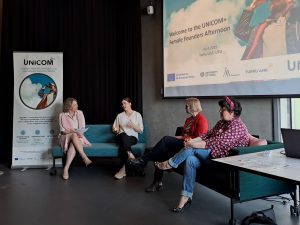Yhä useampi nuori Suomessa kokee yksinäisyyttä, ulkopuolisuutta ja eristäytyneisyyttä. Tähän ongelmaan pyritään puuttumaan NOPPA-hankkeella, jossa osallisuutta lisätään pelillistämisen avulla. …
Tekijät | Authors

Leader- a trust promoter in a multidisciplinary virtual project team
In today’s society virtual project teams are strongly present and, in those teams, trust is a key factor in creating a positive atmosphere for collaboration. Without trust, team members are less likely to express development ideas that lead to innovation. Trust between team members is therefore essential right from the start of the project. However, trust is often seen as a sensitive resource because it is demanding and time-consuming to build, but it can be broken down easily and quickly.
Rapid transformation from co-located teams to virtual teams (VTs)s caused by the COVID-19 pandemic has highlighted the importance of understanding creation of interpersonal trust in VTs. Although, trust as a crucial factor in VTs has been one of the most studied factors, this exceptional situation has given us a unique possibility to study creation of trust in a situation where the project teams have had only one option to work, that is to say, in virtual teams.
In virtual teams trust is often explained as swift trust, which means that in a virtual team it is difficult to get information about each other’s motives and direct experience of their actions, so trust is built on role expectations such as expertise and professionalism. This may refer to more limited and weaker communication.
Trust is often seen as a sensitive resource because it is demanding and time-consuming to build, but it can be broken down easily and quickly.
Milka Leppäkoski, an MBA student at Turku UAS, took the opportunity to write her thesis on the leader´s role in building trust in virtual project teams consisting of diverse team members using English as a lingua franca. The aim of the thesis was to explore how virtual teams can influence and improve the trust between the team members and give suggestions on how the team members can influence the creation and maintenance of trust in a virtual team.
The thesis analyzed the open questions in an electronic survey conducted between 23 April–4 June 2020, related to trust challenges and opportunities to build trust in virtual teams. An invitation to participate in the electronic survey was sent to the authors’ working life networks using social media channels (LinkedIn, Twitter). The study involved 104 people who have worked in an international virtual project team. The respondents were mainly from the fields of manufacturing, education, finance and administration and information and communication. Altogether, 81 said that they have Finnish citizenship. The thesis is part of the Erasmus+ Mupic-project (Multidisciplinary Projects in an International Context) and the results will be useful for the leaders and members of diverse project teams working virtually.
Leader’s role in building trust
In a virtual project team, trust is built through regular open communication, common rules, clear goals and planning of meetings, as well as the functionality of the technical equipment. In a virtual environment, the feeling of presence can only be achieved through regular and active interaction. The results of Milka Leppäkoski´s thesis also showed that in multicultural and multidisciplinary virtual project teams getting to know each other and informal discussions are highlighted at the beginning of the team development to build trust. The importance of creating trust was inevitable; trust increased the feeling of security in interpersonal relationships, as well as improved the open and meaningful exchange of information. The results also showed that both affective trust (relationship-based trust) and cognitive trust (knowledge-based trust) are needed in a virtual team to achieve its goal.
The study found that leadership plays an important and critical role in building especially affective trust. To build trust in a multidisciplinary virtual project team in the best possible way, the team leader should strive to facilitate open communication in the different stages of team development. Usually, a virtual team has members of different languages, cultures, ages and professional experiences, and the team leader must consider these factors so that open conversation can take place between the team members even though they work virtually, and communication cannot therefore be the same as face-to-face.
The leaders first responsibility is to build trust using the right tools and build an atmosphere where the team members are allowed to work freely and share their own expertise and knowledge with the others.
The leaders first responsibility is to build trust using the right tools and build an atmosphere where the team members are allowed to work freely and share their own expertise and knowledge with the others. A sense of togetherness brings the best results in a team and lowers the barriers caused by the diversity of the team members. Ability to understand how the team development stages, diversity of the members and open communication affect building trust between the team members is required especially of the leaders but also of the members. The leader´s role is emphasized at the beginning of the project when the team is starting on a new task and the members are new to each other. Especially in virtual settings the leader will support building both shared mental models and rules for communication which in turn help virtual teams achieve shared goals.
Leader’s responsibilities based on the study:
- creating an environment where people are encouraged to be open and honest in their communications.
- choosing the right means of communication, considering the backgrounds of the team members.
- working with team members to create goals and rules common to all.
- demonstrating appreciation and respect for the team members
Diversity and trust building
The challenges of building trust in multicultural and multidisciplinary virtual teams are different from those in a traditional team that is co-located or collocated team, consisting of individuals working in physical proximit. Facelessness and lack of close interaction can be seen as specific challenges for virtual teams in terms of building trust, as well as creating an open discussion in a virtual work environment. In virtual teams, which use English as a lingua franca, the language skills may differ a lot. In addition, facelessness presents increased challenges in human communication itself as gestures and the tone of voice have an impact on how another team member’s words are interpreted.
Choosing the right tools to facilitate open discussion and versatile use of technology (e.g., use of a camera, chat in the virtual meetings) is crucial for adjusting the possible language differences. Due to high awareness of linguistic differences, team members put in extra effort during interactions, leading to positive outcomes. This means that, a high level of English proficiency is not required, and the communication at an appropriate language level may lead to effective and clear communication supporting building trust if the rules for communication are created.
Allowing the use of versatile technology as well as understanding language differences can also help in understanding different cultural backgrounds. For example, team members may have culturally specific habits or weaknesses that can lead to a misunderstanding of a colleague’s motives. If the leader fails to create trust it may lead to dissatisfaction, resistance, frustration, and isolation. As pointed out earlier, understanding cultural differences is essential but there is no need to fade them. In virtual teams, the members will share their mental models from the beginning of the team development supported by the leader who allows time for the team members to get to know each other.
Team members with different professional backgrounds may face challenges in sharing knowledge in their team. Some of the reasons for these challenges are that team members are defending their existing professional boundaries, or they may fear that sharing may reduce their job security. Ensuring regular social interactions between the team members and good communication via regular meetings is extremely important in VT´s to build trust.
In summary, both affective and cognitive trust are needed in multicultural and multidisciplinary virtual teams. The first stages of the project team development are crucial and the leader´s role is emphasized especially in creating affective trust. Leaders should admit time for the team members to get to know each other and support the team for example by allowing versatile ways of communication. After a successful start the virtual team is ready to focus on the task itself instead of the relationships. The responsibility for maintaining trust will be heavily on the shoulders of the team members of self-managing teams. Team diversity is a positive asset if interpersonal trust is built consciously from the start of the project.
Link to the thesis: https://www.theseus.fi/handle/10024/505106
References
Kauffmann, D., & Golan C. 2019. Communication and trust as facilitators for collaborative innovation development in virtual teams. Jerusalem: Faculty of Engineering, Jerusalem College of Technology Havaad Haleumi. Accessed 11.10.2020 https://www.emerald.com/insight/content/doi/10.1108/HRMID-01-2020-0003/full/html.
Kähönen, P. 2016. Menestyvän projektitiimin salaisuus? Motivoitunut projektitiimi? Osa 3. Accessed 21.12.2020 https://www.pasaati.com/blog/menestyv%C3%A4nprojektitiimin-salaisuus
Mehtab, K., Rehman, A., Ishfaq, S. & Jamil, R. 2017. Virtual leadership: a review paper. Mediterranean Journal of Social Sciences, 183–193.
Varhelahti, M. & Turnquist, T. 2021. Diversity and communication in virtual project teams. To be published in IEEE Transactions on Professional Communication. Accessed 19.5.2021 doi:10.1109/TPC.2021.3064404.








